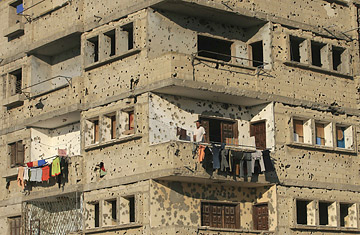
A Palestinian youth stands in a balcony of a building damaged in recent years of conflict with Israel in Rafah on the first day of the truce.
What is this "Tahadiyeh" that has come into effect between Israel and Hamas in Gaza? A truce? A cease-fire? A lull in the fighting? The answer is that it is too early to tell. It is certainly a unique creature: The parties have not negotiated directly between themselves, and have not signed a joint document. Indeed, both insist that the end result was not reached by "negotiation" and they continue to vow that they will never recognize each other, and that neither will rest until the other ceases to exist.
The "Tahadiyeh" is the first-ever understanding between the parties. It was brokered by Egypt's intelligence chief, General Omar Suleiman, and the Egyptians have undertaken to play a key role in its implementation.
Given the declared strategies of the two antagonists, it must be obvious that the truce was born out of acute necessities of either side — and it will last as long as these necessities remain paramount, for it required serious concessions by both sides.
Hamas was the first to request the truce; beleaguered in Gaza and under effective daily attack from Israel's superior military and intelligence arms, it needed respite. He who craves a cease-fire admits to holding an inferior hand. Hamas, therefore, had to shelve, at least for the first six months, its demand that the cessation of hostilities extend to the West Bank; Israel will enjoy free license to continue its daily incursions designed to foil terrorist infiltration from there. Hamas also had to forgo its demand for the immediate opening of the Rafah international border crossing between Gaza and Egypt until a second stage of the understanding is implemented. This second stage will involve the release of the kidnapped Israeli soldier Corporal Gilead Shalit.
Israel had to swallow bitter pills of its own. First and foremost is the implied legitimacy of Hamas as the "sovereign" power in Gaza; second is the implied balance of forces implicit in the understanding — the mutual deterrence that emerges from the standoff, albeit a temporary one.
Will Hamas stick to the agreement? Will it lead the organization to further understandings, thus gradually transforming it into an interim long-term cooling off period in the protracted history of the Israel-Palestinian conflict? This will depend entirely on the leadership of Hamas, both in Gaza and in Damascus. During the past year, Hamas leaders have — first privately, and subsequently in public — made it known that they might accept the 1967 borders as the temporary outline for a Palestinian state. They have stopped short of explicitly recognizing Israel's rights beyond those borders, but such recognition is implicit in what Hamas has been saying.
We are a very, very long way off, but this truce could provide the tenuous beginning of a treacherous path towards coexistence between Israel and Hamas based on the 1967 borders. So, what we have today is a small, but significant step on the way to conflict management.
Neither side has conceded its ultimate aims at this very preliminary stage. The caution and skepticism with which the cease-fire has been greeted in Israel is very understandable; after all, to this day, the geography textbooks in elementary schools throughout the Palestinian Territories — both in Hamas-controlled Gaza, and in the West Bank under the control of Palestinian Authority President Mahmoud Abbas — do not even show Israel on their maps. True acceptance by the Palestinian people of Israel's right to exist remains far, far away.
It is now up to Hamas to decide if this cease-fire becomes a modest beginning of a new path, or a transient phase heralding the ultimate showdown between Israel and Hamas in Gaza.
